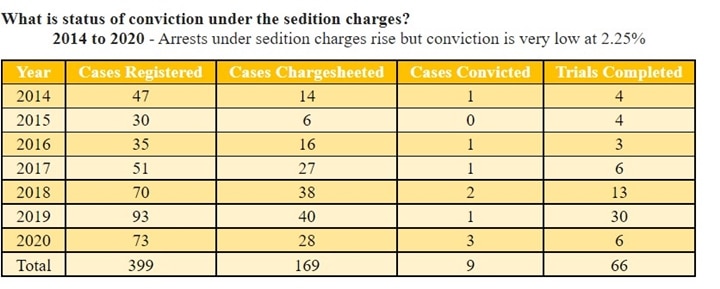Explained: What Is Sedition Law? Know The Status Of Conviction Rate In Sedition Cases
Sedition Law Explained: Here is a look at the sedition law, what has been India's conviction rate and which countries have done away with the penal law.

New Delhi: Amid a raging debate in India on the sedition law, the Supreme Court on Wednesday stayed all proceedings in sedition cases and directed the Centre and states not to register any fresh FIR until the government re-examines the colonial era penal law. The Supreme Court fixed the third week of July for hearing pleas challenging the validity of Section 124-A of the Indian Penal Code, which deals with sedition.
The development comes after the Centre earlier this week told the Supreme Court not to invest time in examining the validity of sedition law as it had decided to go for re-consideration and re-examination of the provisions by a "competent forum".
However, while there has been a rise in cases under sedition law in recent years, the conviction rate has remained abysmally low. Here is a look at the sedition law, what has been India's conviction rate and which countries have done away with the penal law.
What Is The Sedition Law?
As per Section 124-A, the non-bailable provision makes any speech or expression that brings or attempts to bring into hatred or contempt or excites or attempts to excite disaffection towards the government a criminal offence punishable with a maximum sentence of life imprisonment. Imprisonment can be for life-time or for three years based on the nature of seditious charges. Apart from India, sedition law is present in other countries like Saudi Arabia, Sudan, Iran etc.
In 2018, the Law Commission suggested that sedition should be invoked only in cases where the intention behind any act was to disrupt public order or to overthrow the government with violence and illegal means.
It said that dissent and criticism were essential ingredients of a robust public debate on policy issues as part of vibrant democracy. "Therefore, every restriction on free speech and expression must be carefully scrutinised to avoid unwarranted restrictions," the Law Commission had said.

What Is The Status Of Conviction Under Sedition Charges?
Arrests under the sedition law have risen but the conviction rate has been very low — just 2.25 per cent. A total of 399 cases were registered in the country under the controversial colonial era law between 2014 and 2020, and just nine persons were convicted.
Out of the cases registered, chargesheets were filed in 169 cases while only 66 trials have been completed between 2014 and 2020. According to the Ministry of Home Affairs data, 2019 saw the highest, 93, sedition cases being registered.
In 2020, 73 such cases were filed, followed by 70 in 2018, 51 in 2017, 47 in 2014, 35 in 2016, and 30 in 2015. Twenty eight chargesheets were filed in the country in 2020 under the sedition law, 40 in 2019, 38 in 2018, 27 in 2017, 16 in 2016, 14 in 2014, and six in 2015.
Which Countries Have Removed Sedition Laws?
In the United Kingdom, the sedition law was abolished in 2009, saying that the global trend has largely been against sedition and in favour of free speech. The offence of sedition can be traced to the Statute of Westminster in the year 1275 when the King was considered the holder of divine right.
Australia repealed the National Security Legislation Amendment Act, which deals with sedition, in 2010. Singapore also repealed the law, citing that several new legislations can sufficiently address the actual need for sedition law without its chilling effects.
Scotland removed the law in 2010. South Korea did away with its sedition law during legal and democratic reforms in 1988. In 2007, Indonesia declared sedition as "unconstitutional", saying it had been derived from its colonial Dutch masters.
When Did Sedition Law Come Into Force? Who Was The First To Be Arrested?
The law was drafted by British historian-politician Thomas Babington Macaulay in 1837. It came into force in 1862 but the section on sedition was added later in 1870. The section became cognisable only in 1973. Bal Gangadhar Tilak was the first person to be convicted under the law. Mahatma Gandhi was also imprisoned under the law for his articles in Young India.






































